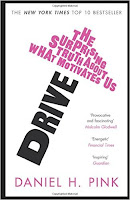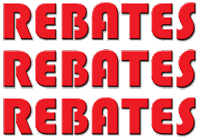Compensation/Commission Thoughts from Daniel Pink
 In case you haven’t noticed, we have been doing a lot of research on the topic of commission-based compensation plans. During the discussion, topics from Daniel Pink’s Drive, The Surprising Truth about What Motivates Us keeps coming forward. I recently re-visited parts of the book and wanted to share a few points to further ramp up the discussion of the matter.
In case you haven’t noticed, we have been doing a lot of research on the topic of commission-based compensation plans. During the discussion, topics from Daniel Pink’s Drive, The Surprising Truth about What Motivates Us keeps coming forward. I recently re-visited parts of the book and wanted to share a few points to further ramp up the discussion of the matter. The common belief is summarized by Pink this way: “Rewarding an activity will get you more of it. Punishing an activity will get you less of it.” This certainly falls in line with the sentiments of distributor managers. When we asked the question,"Why do you employ commissions with your sales department?" the answer came back to drive both quality and quantity of effort (in that order.) One-on-one examination of many plans revealed instances where distributors had applied greater rewards for selling select groups of products as well as rewards for selling into poorly performing or inactive accounts.
Pink went on to site research done by the University of Rochester’s Edward L. Deci which states:
“Careful consideration of reward effects reported in 128 experiments lead to the conclusion that tangible rewards tend to have a substantially negative effect on intrinsic motivation. When institutions – families, schools, business and athletic teams, for example – focus on short term and opt for controlling people’s behavior they do considerable long term damage.”The intrinsic motivation referred to is the person’s internal drive to make things happen and achieve success in the work environment. This is the opposite of the extrinsic motivation which comes from outside, i.e. the manager.
Looking further, Pink quotes from a London School of Economics study: “We find financial incentives… can result in negative impact on overall performance.” This seems like a real bummer for those of us who have heavily invested in commission plans through the years.
The starting point for motivation is a fair and equitable salary. Here the author refers to what one of the distributors we interviewed called the “Current Market Value of a Salesperson" possessing similar skills. If an employee feels as if they are being shorted by the organization, it creates distractions. These distractions, even in their most benevolent form, result in under-performance. In the worst case, under compensation results in loss to a competitor. Your organization, however, doesn’t need to have the highest compensation in the market.
OK now what?
“Any extrinsic reward should be unexpected and offered only after the task is completed…” says Mr. Pink. This is exactly the same advice long given by management expert Ken Blanchard; catch someone doing something right, as a tool for employee empowerment. Both of these experts go on to state that intangible rewards work; often better than money. Formal recognition and compliments on a job well done join fun awards as motivating tools.
Pink goes on to state that “providing useful information,” which describes how the work impacted the situation, can be a major motivator. Here, an example might go something like this: “John, the work you did introducing this new product goes way beyond a simple sale. This product is part of our overall strategy for breaking into a new technology in the market.”
How does this apply to distribution?
Most distributors cling to a half century old compensation model throughout their sales department. Change is tough. As a matter of fact, most distributors recognize a lack of performance and candidly admit their plans often don’t drive the right kind of behavior. Band-Aids have been applied, but largely we’ve played “kick the can” postponing the inevitable. In spite of research and other evidence to the contrary, sticking with commissions.
Make no mistake, changing compensation plans comes with inherent risk. The wrong move can create internal strife and many times can result in loss of scarce and valuable talent. Unpredictable behavior by management scares the heck out of employees. Making any kind of change without a researched and well thought-out plan is not advisable. Now, while times are good, is the time to begin the decision making process.
In the meantime, there are some steps we might consider to garner trust and support within our team. Here are a few thoughts:
• Set reminders to “Catch someone doing something right” and create a habit of rewarding the right behaviors after the fact. Be specific as to the reason for the reward and why you feel it is worthy of praise.
 • Many companies honor someone on their team via a “President’s Award” or other annual award. At the same time, we hear the award often goes to the guy with the highest sales numbers or largest commission check. This is not a problem, as long as the recipient also follows company process, encourages the right cultural behavior and sells the right stuff. Awards based on sales “tonnage” alone should be reconsidered and avoided.
• Many companies honor someone on their team via a “President’s Award” or other annual award. At the same time, we hear the award often goes to the guy with the highest sales numbers or largest commission check. This is not a problem, as long as the recipient also follows company process, encourages the right cultural behavior and sells the right stuff. Awards based on sales “tonnage” alone should be reconsidered and avoided.• Up the ante on information provided. Sellers need to understand not only what is expected of them but why certain behaviors are important to the company. Arguably, and I say this because I know a number of successful folks who are not this way, Baby Boomers were receptive to following orders and “getting the sale” at any cost. The next generation doesn’t see things this way. They need to understand the reason behind the instruction.
Allow me to leave you with a final thought from Drive. Employees respond to culture and culture is never exclusively about profitability. Instead, profitability is a by-product of the right atmosphere. While one of the purposes of a distribution business is adding to the bottom line, there is more to the equation. Our style of business improves customer productivity while creating a stronger local economy. Our business serves the employees; good paying jobs, opportunities and career advancement come to mind. We also sponsor little league teams, scout troops and contribute to local charities. We are the pillar of the main street business you hear about on TV. We have a purpose and a higher calling which extends into the future. Getting our compensation model right is a critical component of making it all happen.
If you don’t have a copy of our white paper comparing the major compensation models in the wholesale industry, drop us a line, we’ll be happy to send it your way. As always, there is no obligation, no sales pitch and we promise not to fill your inbox with emails.




Comments